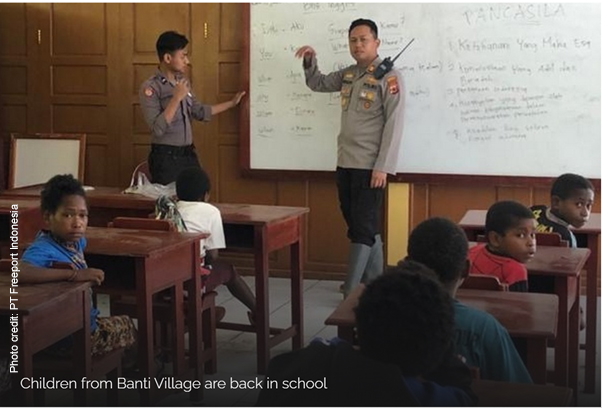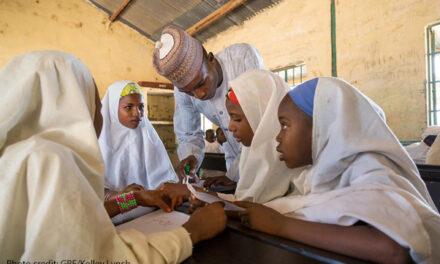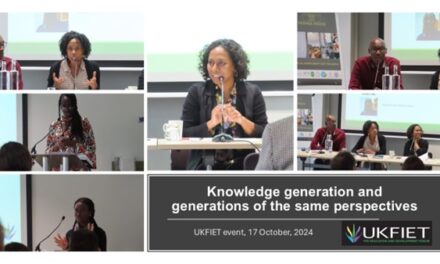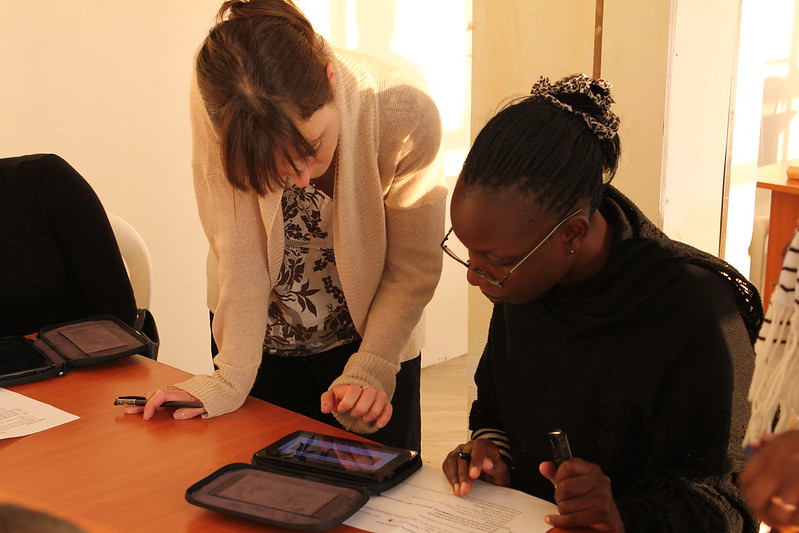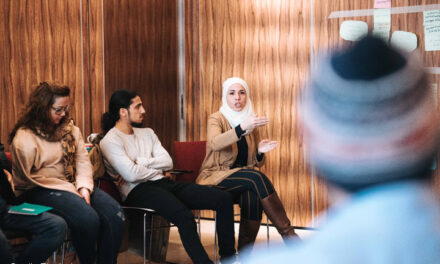This blog was written by Lewis Pyke, an MA Global Development graduate from the University of Leeds.
“We are a coastal people, and we depend on the environment. Nature is a blessing from God, and we are known by the three Ss: sago [trees], sampan [canoes] and sungai [rivers].” The Kamoro’s chief, Hironimus Urmani summarises his people’s loss of culture and identity over more than five decades through the decimation and appropriation of the land they consider sacred. What happens when indigenous culture and education are replaced against a people’s will? This blog outlines a case in West Papua where education is being used as a tool for colonisation and assimilation.
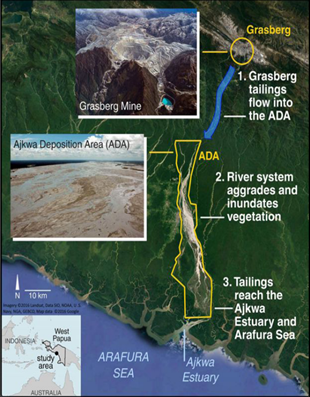
The environmental degradation caused by the tailings from the mine. https://bit.ly/3IWDC56 Image credit: International Coalition for Papua (ICP)
There are few mines that can claim to be as destructive as the Freeport-operated Grasberg/Nemangkawi mine in Indonesian-occupied West Papua.[i] Freeport-McMoran and its Indonesian subsidiary PT Freeport Indonesia have brought immeasurable suffering to the local Amungme and Kamoro communities since a Contract of Work was signed with the Indonesian government in 1967. In collaboration with the Indonesian state, Freeport has been widely accused of extensive human rights violations, intensive resource plundering and internal displacement of the indigenous Kamoro and Amungme communities who live in the vicinity of the mine.
As a result of international pressure that stemmed from these accusations, Freeport was forced to adapt the way it interacted with local indigenous groups, primarily the Kamoro and Amungme. This was mainly manifested through the One Percent Trust Fund, which guaranteed that Freeport would give one per cent of its annual income from the mine to community development projects in areas such as health and education as part of its Corporate Social Responsibility (CSR) agenda. However, the nature of the education initiatives offered, particularly the environmental education programmes, as well as the culturally-insensitive curriculum demonstrate that these education initiatives resemble an attempt by Freeport to deny West Papuans the rights to their customary land and subdue their indigenous identity in the name of integration into the Indonesian nation state.
Freeport supports an active outreach programme to assist employees and the local population to become more eco-conscious and helping them gauge a greater sense of what environmental sustainability entails. However, this assumes that the local Amungme and Kamoro communities currently lack an eco-consciousness based on their current traditional knowledge. This is representative of Freeport’s active ignorance of the relationship between these indigenous communities and their natural environment. In the case of the Amungme, ‘to destroy their environment is akin to their own destruction’. Freeport fails to acknowledge this relationship because it has continuously failed to recognise the customary land rights of the indigenous communities through their continuous displacement, whilst causing irreversible environmental destruction on their lands. Ultimately, Freeport’s environmental education initiative symbolises a narcissistic ideology amongst large extractive corporations that devalues the local knowledge of the indigenous peoples considering them backward, primitive and in need of a national form of education.
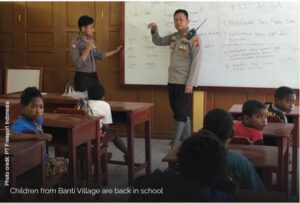
Image from Freeport publication of West Papuan children being taught about the Pancasila Philosophy in Bahasa Indonesia (PT Freeport Indonesia, 2020). Bit.ly/3tBgy5h
Another concerning feature of Freeport’s education initiatives for the local Amungme and Kamoro communities is the overwhelmingly Indonesian focus of the curriculum. Indonesianisation has long been the Indonesian state’s attempt to Javanise its native populations, (particularly the Melanesian West Papuans) through education by promoting the homogenisation of Indonesian culture, language and politics.[ii] The expression of the Pancasila Philosophy and the unity of ‘one Indonesian nation’ is at the core of this Indonesianisation. However, this is at odds with Melanesian principles of equivalence and reciprocity that facilitates West Papuan linguistic and cultural diversity. Depictions in Freeport’s media publications undoubtedly demonstrate an adherence to this Pancasila Philosophy and therefore Indonesianisation. Furthermore, Freeport’s programmes use Bahasa Indonesia as the medium of instruction, which is not the mother tongue of indigenous West Papuans. Freeport’s education initiatives therefore symbolise an ignorance towards West Papuans, particularity as they fail to acknowledge their cultural diversity in any form, whilst also simultaneously facilitating a slow burning linguistic genocide of indigenous West Papuan languages.
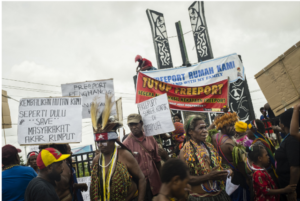
West Papuan citizens protest against PT Freeport Indonesia’s compensation offer in Mimika, Papua. https://bit.ly/3IWDC56 Photo credit: ICP/Albertus Vembrianto.
The poor state of education for indigenous West Papuans presents them with a dilemma of either accepting the culturally insensitive education initiatives of Freeport or risk missing out on an education all together. Ultimately, this is representative of Freeport, in collaboration with the Indonesian state, denying the West Papuans their right to an appropriate system of education all in the name of assimilation into an overwhelmingly Indonesian culture.
Although Freeport would claim that their education initiatives for the local Amungme and Kamoro communities have provided them with an education they would otherwise be without, the initiatives are undoubtedly a key mechanism for Freeport to continue to exert their dominance over the local population. By providing the communities with an education that is intent on extractive and intensive land uses, Freeport are denying the Kamoro and Amungme their ability to express their culture freely on their lands without interference. This is symptomatic of indigenous communities continuing to battle against neo-colonial forces who are determined to use education as a tool of domination and assimilation.
[i] Nemangkawi is the local name for the mountain given by the Amungme and Kamoro communities. Grasberg is the colonial name given by the Nineteenth Century Dutch colonialists.
[ii] Java is the most populous island in Indonesia, home to the capital Jakarta. Indonesianisation is seen as being synonymous with Javanisation.

